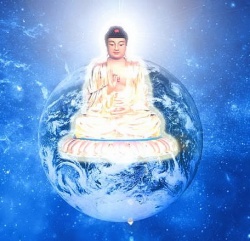Difference between revisions of "Seven Treasures"
| Line 1: | Line 1: | ||
[[File:Ies4peace3.jpg|thumb|250px|]] | [[File:Ies4peace3.jpg|thumb|250px|]] | ||
<poem> | <poem> | ||
| − | '''seven treasures''' (七寶). | + | '''[[seven treasures]]''' (七寶). |
These are | These are | ||
| − | (1) suvarṇa (金, gold); | + | (1) [[suvarṇa]] (金, {{Wiki|gold}}); |
| − | (2) rūpya (銀, silver); | + | (2) [[rūpya]] (銀, {{Wiki|silver}}); |
| − | (3) vaiḍūrya (琉璃, aquamarine); | + | (3) [[vaiḍūrya]] (琉璃, aquamarine); |
| − | (4) sphaṭika (頗梨, crystal); | + | (4) [[sphaṭika]] (頗梨, {{Wiki|crystal}}); |
| − | (5) musāragalva (硨磲, conch shell or white coral); | + | (5) [[musāragalva]] (硨磲, [[conch shell]] or white coral); |
| − | (6) lohita-muktikā (赤珠, ruby); and | + | (6) [[lohita-muktikā]] (赤珠, {{Wiki|ruby}}); and |
| − | (7) aśmagarbha (瑪瑙, emerald). | + | (7) [[aśmagarbha]] (瑪瑙, {{Wiki|emerald}}). |
| − | Sometimes coral and amber are included in place of crystal and ruby. F. Max Müller cites a reference in Buddhist Mahāyāna Texts (Cowell et al. [1894] 1969, part 2, 92), in which vaiḍūrya is matched with lapis lazuli, and aśmagarbha with diamond. While lapis lazuli is an opaque intense blue stone, indications in the sūtras are that vaiḍūrya should be a transparent blue beryl, such as aquamarine. According to the Monier-Williams Online Dictionary, aśmagarbha is emerald; vajra (伐折羅) is diamond, an adamantine mineral (金剛) | + | Sometimes coral and amber are included in place of {{Wiki|crystal}} and {{Wiki|ruby}}. F. {{Wiki|Max Müller}} cites a reference in [[Buddhist]] [[Mahāyāna Texts]] (Cowell et al. [1894] 1969, part 2, 92), in which [[vaiḍūrya]] is matched with [[lapis lazuli]], and [[aśmagarbha]] with [[diamond]]. While [[lapis lazuli]] is an opaque intense blue stone, indications in the [[sūtras]] are that [[vaiḍūrya]] should be a transparent [[blue beryl]], such as aquamarine. According to the {{Wiki|Monier-Williams}} Online {{Wiki|Dictionary}}, [[aśmagarbha]] is {{Wiki|emerald}}; [[vajra]] ([[伐折羅]]) is [[diamond]], an [[adamantine]] mineral ([[金剛]]) |
</poem> | </poem> | ||
{{R}} | {{R}} | ||
Revision as of 09:58, 21 November 2013
seven treasures (七寶).
These are
(1) suvarṇa (金, gold);
(2) rūpya (銀, silver);
(3) vaiḍūrya (琉璃, aquamarine);
(4) sphaṭika (頗梨, crystal);
(5) musāragalva (硨磲, conch shell or white coral);
(6) lohita-muktikā (赤珠, ruby); and
(7) aśmagarbha (瑪瑙, emerald).
Sometimes coral and amber are included in place of crystal and ruby. F. Max Müller cites a reference in Buddhist Mahāyāna Texts (Cowell et al. [1894] 1969, part 2, 92), in which vaiḍūrya is matched with lapis lazuli, and aśmagarbha with diamond. While lapis lazuli is an opaque intense blue stone, indications in the sūtras are that vaiḍūrya should be a transparent blue beryl, such as aquamarine. According to the Monier-Williams Online Dictionary, aśmagarbha is emerald; vajra (伐折羅) is diamond, an adamantine mineral (金剛)
